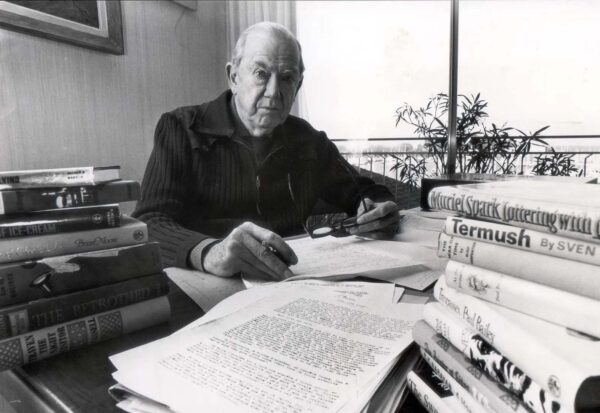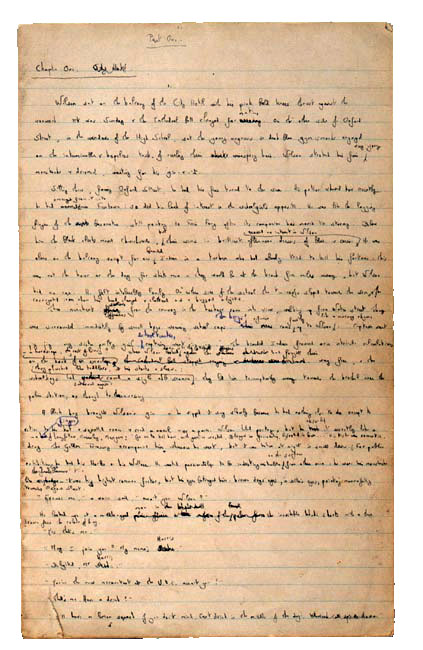
Graham Greene, 1964. Portrait by Yousuf Karsh.
Official website of the author
I was interested to read on Sarah’s blog about the fuss John Banville raised recently. Banville said, undiplomatically, that he writes more quickly and easily as crime writer “Benjamin Black” than he does writing literary novels under his own name. There were hurt feelings, suggestions that Banville was “slumming,” and the author felt compelled to issue a foot-shuffling clarification. “The distinction between good writing and bad,” he said, “is the only one worth making.”
That is so obviously untrue — lots of distinctions beyond good/bad are worth making — that Banville must have held his nose while typing it. The whole thing reminds me of Michael Kinsley’s definition of a Washington gaffe: when a politician inadvertently tells the truth in public.
Does anyone really doubt that an author would find it easier to write freely when he is working in a genre with established conventions? There are plenty of challenges to genre writing, of course. The writer can stick to the conventions, subvert them in various ways, update them, etc. But the rules do exist. The relative difficulty in writing “literary” novels is not that there aren’t models to follow; non-genre writers mimic older stories all the time. The difficulty — at least the one Banville meant — is that storytelling conventions are less clear and less important. The writer is at sea. That is why literary writers like Banville, Richard Price, and E.L. Doctorow (Billy Bathgate) feel relieved when they come to crime writing. Finally, there is a roadmap, a method to plotting the story. As a crime writer, I am thankful for that roadmap every day.
It is also obvious that genre novels place a higher priority on entertaining the reader. This is the umpteenth rehash of Graham Greene’s old distinction between novels and entertainments, and the only remaining mystery is why on earth we continue to worry about it. Listen to Greene (see below) as he briefly discusses the subject. It turns out, the novels/entertainments distinction didn’t hold up very well even for the man who invented it. “Most of my novels have an element of melodrama,” Greene concedes, even the literary ones. All novels need drama, even the melo- kind.
So let’s not be so touchy, crime fans. Entertainments — yes, crime novels included — are indeed easier to write, just as Banville says. They are also generally easier to read, precisely because they take seriously the writer’s duty to entertain. Why apologize for it?
By the way, I always find it a little disconcerting to hear or see an author whose books I love. The authorial voice is one the reader creates in her own head. Greene’s actual, reedy voice is not the one I’d imagined for him. (Click below to hear him.) Yet another example of the internet revealing too much.
[jwplayer config=”Landay Audio Player” file=”/wp-content/uploads/2009/08/05-Novels-And-Entertainments.mp3″ /]

In The End of the Affair, Graham Greene described what was in fact his own method of working.
Over twenty years I have probably averaged five hundred words a day for five days a week. I can produce a novel in a year, and that allows time for revision and the correction of the typescript. I have always been very methodical, and when my quota of work is done I break off, even in the middle of a scene. Every now and then during the morning’s work I count what I have done and mark off the hundreds on my manuscript. No printer need make a careful cast-off of my work, for there on the front page is marked the figure — 83,764. When I was young not even a love affair would alter my schedule. A love affair had to begin after lunch, and however late I might be in getting to bed — as long as I slept in my own bed — I would read the morning’s work over and sleep on it. … So much of a novelist’s writing, as I have said, takes place in the unconscious; in those depths the last word is written before the first word appears on paper. We remember the details of our story, we do not invent them.
Coincidentally, in the summer of 1950 Michael Korda happened to witness Greene at work on The End of the Affair. That summer Korda vacationed with Greene and others aboard a yacht called Elsewhere off the coast of Antibes. Korda was sixteen at the time, Greene forty-five. Korda later described watching the famous writer at work during this cruise.
An early riser, he appeared on deck at first light, found a seat in the shade of an awning, and took from his pocket a small black leather notebook and a black fountain pen, the top of which he unscrewed carefully. Slowly, word by word, without crossing out anything, and in neat, square handwriting, the letters so tiny and cramped that it looked as if he were attempting to write the Lord’s Prayer on the head of a pin, Graham wrote, over the next hour or so, exactly five hundred words. He counted each word according to some arcane system of his own, and then screwed the cap back onto his pen, stood up and stretched, and, turning to me, said, “That’s it, then. Shall we have breakfast?” I did not, of course, know that he was completing The End of the Affair, the controversial novel based on his own tormenting love affair, nor did I know that the manuscript would end, typically, with an exact word count (63,162) and the time he finished it (August 19th, 7:55 A.M., aboard Elsewhere).
Greene’s self-discipline was such that, no matter what, he always stopped at five hundred words, even if it left him in the middle of a sentence. It was as if he brought to writing the precision of a watchmaker, or perhaps it was that in a life full of moral uncertainties and confusion he simply needed one area in which the rules, even if self-imposed, were absolute.
As he got older, Greene found it harder to maintain his clockwork discipline. Twenty years after that summer aboard the Elsewhere, Greene gave an interview to a reporter from the New York Times. Greene was then 66.
I hate sitting down to work. I’m plugging at a novel now which is not going easily. I’ve done about 65,000 words — there’s still another 20,000 to go. I don’t work for very long at a time — about an hour and a half. That’s all I can manage. One may come back in the evening after a good dinner, one’s had a good drink, one may add a few little bits and pieces. It gives one a sense of achievement. One’s done more than one’s thought.
There are certain writers who seem to write like one has diarrhea — men like Durrell for instance. Perhaps their bowels get looser and looser with age. I’m astonished at someone like Conrad who was able to write 12 hours on end — it’s superhuman, almost.
It’s like a strain on the eyesight. I find that I have to know — even if I’m not writing it — where my character’s sitting, what his movements are. It’s this focusing, even though it’s not focusing on the page, that strains my eyes, as though I were watching something too close.
…
In the old days, at the beginning of a book, I’d set myself 500 words a day, but now I’d put the mark to about 300 words.
The reporter added, a little dubiously, “Did he mean that literally — a mark after every 300 words? Precisely. With an x he marks the first 300 words, 600x comes next, 900x after 900 words.”
Personally, I have never counted words. I have no idea how many words my novels contain. When I am writing and a scene is flowing, the feeling is precisely the opposite of Greene’s methodical word-counting — “the precision of a watchmaker.” For me, writing is like a trance, and holding onto that dream-state is a precarious thing. I would be afraid to stop to count my words for fear of interrupting the dream and losing the rest of the scene. Remember, too, that Greene had to stop and laboriously count his words by hand, with no computers to do the busywork for him. I count scenes and chapters, sometimes pages. That’s it. I don’t prefer my method or recommend it. My method is more erratic and less productive. It is hardly a method at all. But I seem to have no choice. Word-counting has never worked for me.
That is probably why I marvel at Greene’s discipline, his steadiness and regularity. He had such a sure hold on his stories even as he wrote them, in their first iteration. Look at the manuscript page below. It is the original handwritten draft of The Heart of the Matter, which now resides at Georgetown’s Lauinger Library. There are virtually no corrections. He has already imagined the entire scene. When he uncaps his pen and bends over the page to begin composing sentences, he “remembers” the details of his story rather than inventing them. It is as if Greene is taking dictation.

Update: A short audio clip of Graham Greene discussing his work method is available here.